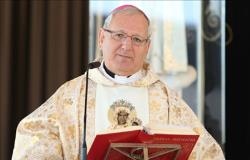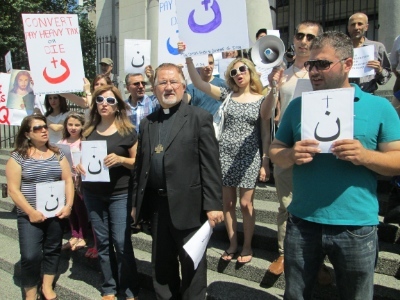
Iraqi Christians gathered to support – and protest the treatment of – their compatriots who are still being persecuted.
Update: Iraqi Christians in Metro Vancouver are again asking the local community to join them in fasting and praying for the persecuted in Iraq on the steps of the Vancouver Art Gallery, from 11 am to 2 pm this Saturday (August 16).
How many Iraqi Christians can there be in Metro Vancouver? Not too many, but a large number of them were gathered on the steps of the Vancouver Art Gallery last Saturday (July 26) to protest the treatment of their fellow believers back home.
Iraqi Christians in Mosul are being forced to choose between converting to Islam, leaving their homes and belongings, or paying a high protection tax to the Islamic State in Mosul if they choose to keep their faith and stay at their homes.
Since 2003, our families throughout Iraq have been subjected to ultimatums to convert or leave town. Many had to flee from Baghdad, Mosul and other cities.
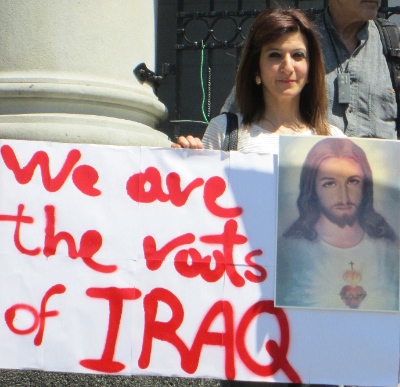 The spillover of jihadists from Syria into northern Irag has created a continuous humanitarian catastrophe for minorities living in that area, especially Christians.
The spillover of jihadists from Syria into northern Irag has created a continuous humanitarian catastrophe for minorities living in that area, especially Christians.
Last week, around 1,100 Christian families had to flee Mosul without money, and even the basic essentials were left behind. Their wedding rings, passports, IDs, jewellery and cars were confiscated by the jihadists on their way out of Mosul.
We are asking the Canadian government to be our voice and adopt this issue, to take it to the UN to demand international action to find an end to the Iraqi humanitarian crisis.
Karam told me that his last name – Abdul-Ahad – might sound Muslim, but it actually means ‘Sunday worship.’ The jihadists he referred to are members of Isis (Islamic State in Iraq and the Levant) – now, apparently, referring to itself simply as Islamic State – which has taken over a large swath of Syria and Iraq since the beginning of June.
Chaldean Catholic Patriarch Louis Sako of Baghdad, said in a BBC news story: “For the first time in the history of Iraq, Mosul is now empty of Christians.”
Before 2003, he said, the number of Christians in the city had been about 60,000, but that had dropped to about 35,000 by June this year, with another 10,000 fleeing Mosul after Isis took control and numbers falling rapidly since. (Christians in Iraq as a whole numbered about 1,500,000 in 2003, but it is estimated that the number had dropped to less than 450,000, maybe even as few as 200,000, by 2013.)
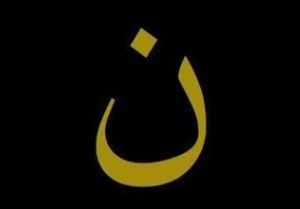 In a July 17 statement issued by the Assyrian International News Agency (AINA), Pako said ISIS has begun marking Christian homes with the Arabic letter ‘n’ which stands for the word ‘Nasrani,’ which in turn means ‘Christian’ in Arabic. Properties have also been marked as “property of the Islamic State.”
In a July 17 statement issued by the Assyrian International News Agency (AINA), Pako said ISIS has begun marking Christian homes with the Arabic letter ‘n’ which stands for the word ‘Nasrani,’ which in turn means ‘Christian’ in Arabic. Properties have also been marked as “property of the Islamic State.”It is truly unjust now to treat Christians by rejecting them and throwing them away, considering them as nothing. It is clear that the result of all this discrimination legally enforced will be the very dangerous elimination of the possibility of co-existence between majorities and minorities.
It will be very harmful to Muslims themselves both in the near and the distant future. Should this direction continue to be pursued, Iraq will come face to face with human, civil and historic catastrophe. . . .
The Holy Qur’an has ordered believers to respect the innocent and has never called them to seize the belongings, the possessions, the properties of others by force. The Qur’an commands refuge for the widow, the orphaned, the poor and the weaponless and respect “to the seventh neighbour.”
A recent article by Gwynne Dyer – Middle East Christians are going, going, gone – puts the Iraq situation into a broader perspective. His pessimistic conclusion:
What has changed? For many centuries, the Christian minority of Arabs lived in relative peace and prosperity under Muslim rule. In the early 20th century, they were in the forefront of the nationalist and literary renaissance in the Arab world. But in the past decade, about a quarter of the Arab world’s 12 million Christians have emigrated, and the flow is increasing every year.
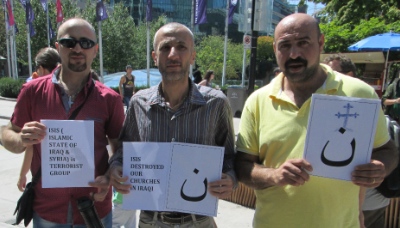
These three men have had to leave Iraq; one has family members who fled Mosul to a neighbouring village and have no way to esape Iraq.
Most of them are not facing execution, like Meriam Ibrahim [in Sudan] or the former residents of Mosul. They just feel excluded from an Arab discourse that is increasingly radicalized and obsessed with religious differences – both Muslim-Christian ones and Sunni-Shia ones – and they have lost hope. They are Arabs who have lost their place in the Arab world, and they have to find one elsewhere.
Vancouver Iraqis have not given up hope, perhaps. But they clearly feel angry and abandoned, We can pray for them, and urge our government to take up their cause. Some might wish to reach out the to community personally as well. This Facebook page is a good place to start.

